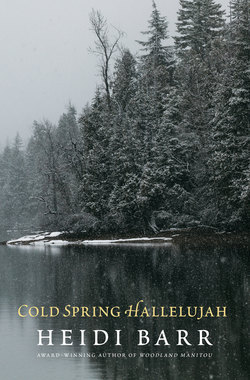Читать книгу Cold Spring Hallelujah - Heidi Barr - Страница 6
На сайте Литреса книга снята с продажи.
3
ОглавлениеThis collection of poems came into being one cold spring, at what would be the close of a long struggle with persistent illness—not the sort of illness that leaves you bedridden or enduring invasive treatments, just the kind that leaves you cranky, lethargic, and wondering if this is just how it’s going to be from now on. I would start to feel better and then another round of fatigue and coughing or some other infection or allergy would invade and the cycle would start all over again. It felt like I had too many things to manage, things were too hard, there were too many projects and work commitments and responsibilities—and not enough energy for it all. I wanted to be living a life rooted in simplicity, and I was tired of not feeling like myself. So I started writing one poem a day in a journal—just the things that were on my mind—no perfecting, no agonizing over the quality, just jotting down whatever words came through the pen that particular day. Poems were the right length, and their simplicity and brevity seemed like something my life at the time needed. Thoughts about self acceptance to seedlings to social media to hiking to God (and everything in between) were swirling around, and focusing on the words that found their way onto paper was one way of processing what felt like a constant, albeit muted, struggle. I wanted to claim the story that was mine, whatever that turned out to be, even if it wasn’t what I would have chosen in an ideal world. Short arrangements of words seemed to somehow help with doing that.
You could say we are all broken, but then again, you could say we are all part of a collective hallelujah, and that might be closer to the truth. The world is made of stories, which are made of words, or just ideas, spoken or not, and all stories can be interpreted and told differently. It depends on the lenses through which the world is viewed and the languages spoken and heard. But no matter what stories we find ourselves in and no matter how we interact with the multitudes that constantly swirl around us, everyone can benefit from an invitation to claim truth.
So, an invitation, if I may be so bold:
Claim the stories that invite peace. Claim the stories that create a more beautiful world, whatever beauty looks and feels like to you right now. Claim the right to choose the things that call instead of the things that beckon or taunt. Claim the clarity that listening to the deep and still parts of yourself can offer. Claim the stories that originate in your soul, the stories that bind you to the earth as part of one universal body. Claim the stories that proclaim your (sometimes fractured) human radiance in ways that the wind and the rain and the morning sun can understand.
This is certainly not a simple invitation to accept: Claiming is not an easy task, just like telling a true story can be the most challenging feat of a lifetime. But acknowledging and giving voice to the story that wants to be claimed is the first step—something that has to happen to shore up the foundation for a beautiful way of being in the world.
I’ve been drawn to these words of Dr. Clarissa Pinkola Estes ever since I read them years ago: She writes, “If you have a deep scar, that is a door, if you have an old, old story, that is a door. If you love the sky and the water so much you almost cannot bear it, that is a door. If you yearn for a deeper life, a full life, a sane life, that is a door.” We all have a door into the story which is ours to embody and proclaim. It may be broken, or off its hinges, or hidden behind weeds, but it’s there and worthy of a hallelujah.
